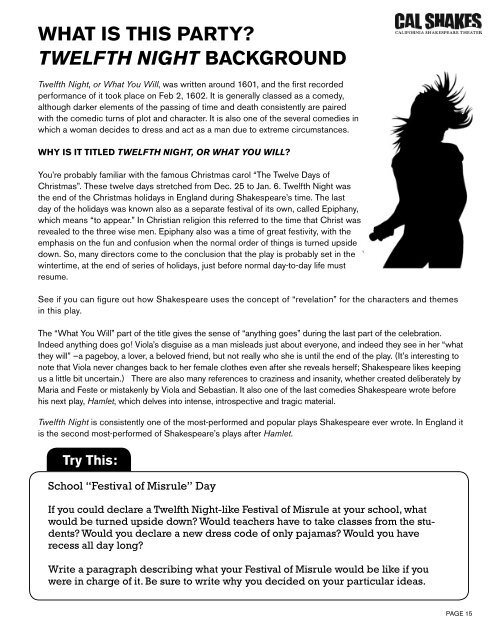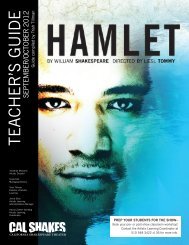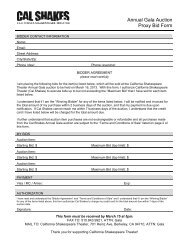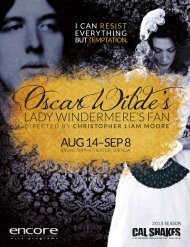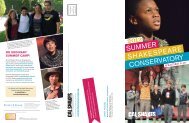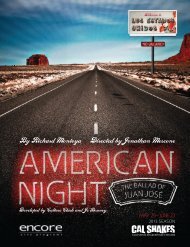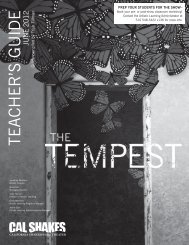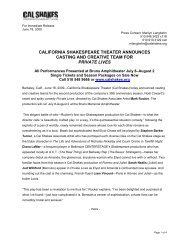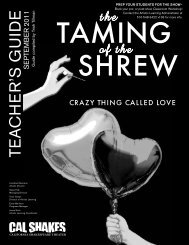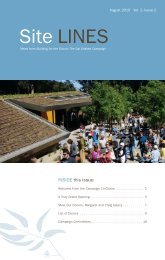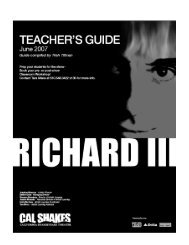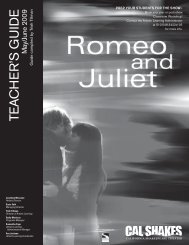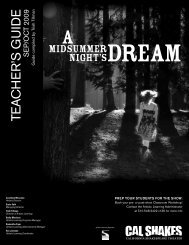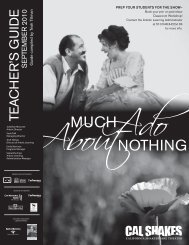Twelfth Night teacher's guide - California Shakespeare Theater
Twelfth Night teacher's guide - California Shakespeare Theater
Twelfth Night teacher's guide - California Shakespeare Theater
You also want an ePaper? Increase the reach of your titles
YUMPU automatically turns print PDFs into web optimized ePapers that Google loves.
WHAT IS THIS PARTY?<br />
<strong>Twelfth</strong> <strong>Night</strong> Background<br />
<strong>Twelfth</strong> <strong>Night</strong>, or What You Will, was written around 1601, and the first recorded<br />
performance of it took place on Feb 2, 1602. It is generally classed as a comedy,<br />
although darker elements of the passing of time and death consistently are paired<br />
with the comedic turns of plot and character. It is also one of the several comedies in<br />
which a woman decides to dress and act as a man due to extreme circumstances.<br />
Why is it titled <strong>Twelfth</strong> <strong>Night</strong>, or What You Will?<br />
You’re probably familiar with the famous Christmas carol “The Twelve Days of<br />
Christmas”. These twelve days stretched from Dec. 25 to Jan. 6. <strong>Twelfth</strong> <strong>Night</strong> was<br />
the end of the Christmas holidays in England during <strong>Shakespeare</strong>’s time. The last<br />
day of the holidays was known also as a separate festival of its own, called Epiphany,<br />
which means “to appear.” In Christian religion this referred to the time that Christ was<br />
revealed to the three wise men. Epiphany also was a time of great festivity, with the<br />
emphasis on the fun and confusion when the normal order of things is turned upside<br />
down. So, many directors come to the conclusion that the play is probably set in the<br />
wintertime, at the end of series of holidays, just before normal day-to-day life must<br />
resume.<br />
See if you can figure out how <strong>Shakespeare</strong> uses the concept of “revelation” for the characters and themes<br />
in this play.<br />
The “What You Will” part of the title gives the sense of “anything goes” during the last part of the celebration.<br />
Indeed anything does go! Viola’s disguise as a man misleads just about everyone, and indeed they see in her “what<br />
they will” —a pageboy, a lover, a beloved friend, but not really who she is until the end of the play. (It’s interesting to<br />
note that Viola never changes back to her female clothes even after she reveals herself; <strong>Shakespeare</strong> likes keeping<br />
us a little bit uncertain.) There are also many references to craziness and insanity, whether created deliberately by<br />
Maria and Feste or mistakenly by Viola and Sebastian. It also one of the last comedies <strong>Shakespeare</strong> wrote before<br />
his next play, Hamlet, which delves into intense, introspective and tragic material.<br />
<strong>Twelfth</strong> <strong>Night</strong> is consistently one of the most-performed and popular plays <strong>Shakespeare</strong> ever wrote. In England it<br />
is the second most-performed of <strong>Shakespeare</strong>’s plays after Hamlet.<br />
Try This:<br />
School “Festival of Misrule” Day<br />
If you could declare a <strong>Twelfth</strong> <strong>Night</strong>-like Festival of Misrule at your school, what<br />
would be turned upside down? Would teachers have to take classes from the students?<br />
Would you declare a new dress code of only pajamas? Would you have<br />
recess all day long?<br />
Write a paragraph describing what your Festival of Misrule would be like if you<br />
were in charge of it. Be sure to write why you decided on your particular ideas.<br />
PAGE 15


